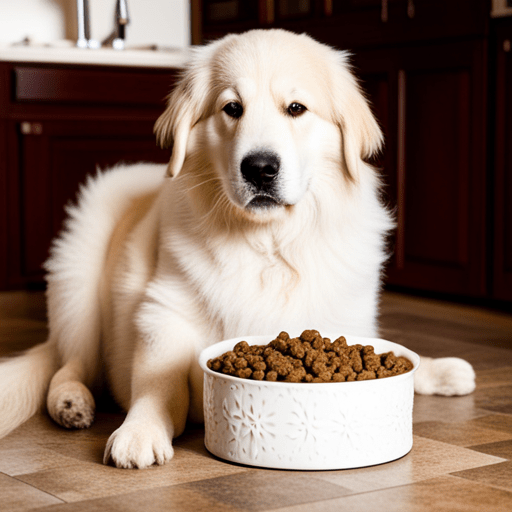Great Pyrenees are large and energetic dogs that need a lot of food to keep up with their active lifestyles. But with so many different types of dog food available in the market, it can become overwhelming to decide which brand or type is right for your furry friend. And, not to mention, Great Pyrenees are prone to certain health problems that could be exacerbated by poor diet. In this blog post, we’ll discuss the best types of dog food for Great Pyrenees, as well as what to avoid, so you can make an informed decision and keep your pup healthy and happy.
Monitor weight and calorie intake
Firstly, it’s important to note that Great Pyrenees are prone to obesity, so it’s crucial to monitor their weight and calorie intake. Look for dog food that’s specifically formulated to meet the nutritional requirements of large breeds, as they need a balanced diet that’s high in calories and nutrients. Make sure that the food you choose has a protein content of at least 25%, as protein is essential for muscle growth and repair, and is also crucial for maintaining a healthy immune system.
As pet owners, we all want the best for our furry friends, and that includes providing them with a nutritious diet to keep them healthy and happy. When it comes to feeding a Great Pyrenees, it’s important to monitor their weight and calorie intake to avoid potential health issues. These gentle giants have a slower metabolism and tend to gain weight easily, so selecting the right dog food is crucial. Paying attention to the ingredients and nutritional value of the food you choose can go a long way in maintaining their weight and overall well-being. By making the necessary adjustments to their diet and keeping track of their intake, your Great Pyrenees can live a long and healthy life by your side.
Ingredients in your dog’s food
Next, consider the ingredients in your dog’s food. Avoid dog food that contains by-products, fillers, dyes or artificial flavors. Opt for dog food that contains real meat as the first ingredient and whole grains such as brown rice or oats, which are a good source of fiber and help to keep your dog feeling full.
Choosing the best dog food for your Great Pyrenees involves more than just scanning the packaging for flashy logos and irresistible promises. As a responsible pet parent, you need to take the time to carefully analyze the ingredients list and understand what your furry friend is eating. The quality of the ingredients used in your dog’s food can have a huge impact on their well-being and overall health. Look for protein sources like chicken, lamb, and fish as well as complex carbohydrates like sweet potatoes and brown rice. Avoid fillers and artificial preservatives like corn, soy, and additives like BHA and BHT. By doing your research and being diligent about your dog’s nutrition, you can ensure that they are getting the best possible food to keep them thriving and happy.
Kibble, wet, or raw food?
When it comes to choosing between kibble, wet, or raw food, there is no one-size-fits-all answer. However, generally speaking, dry kibble is the most convenient and affordable option, while wet food is easier to digest and can be a good choice for senior dogs or those with dental issues. Raw food might be an option, but it requires more preparation and can be more expensive.
Choosing the best dog food for Great Pyrenees can be a daunting task. With so many options available, it can be overwhelming to decide whether to go for Kibble, wet or raw food. However, the right choice can make all the difference to your furry friend’s health and happiness. Kibble, which is the most common form of dog food, is convenient and affordable. Wet food, on the other hand, is great for dogs who prefer a moist and flavorful meal. Lastly, raw food is a popular choice for pet owners who want to give their dogs a diet that mimics what they would eat in the wild. In the end, the decision will depend on your dog’s individual needs and preferences. Whatever you choose, make sure it is a high-quality dog food that provides all the necessary nutrients and keeps your Great Pyrenees happy and healthy.
Prone to certain health problems
Great Pyrenees are prone to certain health problems, including hip dysplasia and bloat, so you should also take this into account when choosing their food. Look for food that contains ingredients that promote joint health, such as glucosamine and chondroitin. Foods that have smaller kibble sizes and encourage slower eating can also help to prevent bloat.
Great Pyrenees are a beautiful and majestic breed, but unfortunately, they are prone to certain health problems. It is important to choose the best dog food for them to help prevent or manage any potential issues. Great Pyrenees can suffer from hip dysplasia, bloat, and skin allergies, just to name a few. By selecting a high-quality dog food that is specifically formulated for large breeds and contains natural ingredients, you can give your Great Pyrenees the nutrition they need to thrive and maintain their health. Don’t compromise on your furry friend’s wellbeing – choose the right dog food for them today.
Conclusion
Choosing the right food for your Great Pyrenees can seem daunting, but by following these guidelines, you can ensure that your pup is getting all the necessary nutrients for a healthy and happy life. Keep in mind that every dog is different and may have varying needs, so don’t hesitate to talk to your vet if you have any concerns. With the right diet and exercise, your Great Pyrenees will thrive for years to come.
